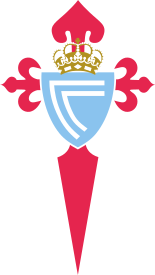Celta Vigo
 |
|
| Full name | Real Club Celta de Vigo, S.A.D. |
|---|---|
| Nickname(s) |
Célticos (The Celts/Celtics) Celestes (The Sky Blues) Celtiñas (The Little Celta) |
| Founded | 23 August 1923 |
| Ground | Balaídos |
| Capacity | 29,000 |
| Coordinates | 42°12′42.609″N 8°44′22.9266″W / 42.21183583°N 8.739701833°WCoordinates: 42°12′42.609″N 8°44′22.9266″W / 42.21183583°N 8.739701833°W |
| President | Carlos Mouriño |
| Head Coach | Eduardo Berizzo |
| League | La Liga |
| 2015–16 | La Liga, 6th |
| Website | www |
Real Club Celta de Vigo (Galician pronunciation: [reˈal ˈkluβ ˈθelta ðe ˈβiɣo]; Royal Club Celta de Vigo), or simply Celta Vigo or sometimes just Celta, is a Spanish professional football club based in Vigo, Galicia, currently playing in La Liga. It was founded on 23 August 1923 following the merger of Real Vigo Sporting and Real Fortuna Foot-ball Club. Nicknamed Os Celestes (The Sky Blues), they play in sky blue shirts and socks along with white shorts. The club's home stadium is Balaídos, which seats 29,000 spectators. Celta's name is derived from the Celts who were once present in the region. Its main rival is fellow Galician club Deportivo de La Coruña, with whom it contests the Galician derby.
Celta have never won the league title nor Copa del Rey, although they have reached the final three times in the latter. One of the team's best seasons was 1970–71, when they finished unbeaten at home and were known as the "giant-killers". Celta came sixth that season and qualified for the UEFA Cup for the first time. The club finished in their best-ever position of fourth in 2002–03, qualifying for the 2003–04 UEFA Champions League, where they were eliminated by Arsenal in the Round of 16.
R.C. Celta de Vigo was formed as a result of the ambition of Vigo's teams to achieve more at national level, where the Basque sides had been their bête noire in the Spanish Championship. The idea was to merge both teams to create a more powerful team at national level. The standard-bearer of this movement was Manuel de Castro, known as "Handicap", a sports writer for the Faro de Vigo who, from 1915, began to write in his articles about the need for a unitarian movement. The slogan of his movement was "Todo por y para Vigo" ("All for and to Vigo"), which eventually found support among the managers of Real Vigo Sporting and Real Club Fortuna de Vigo. It was backed unanimously when de Castro himself presented the motion at the assembly of the Royal Spanish Football Federation in Madrid on 22 June 1923.
...
Wikipedia
